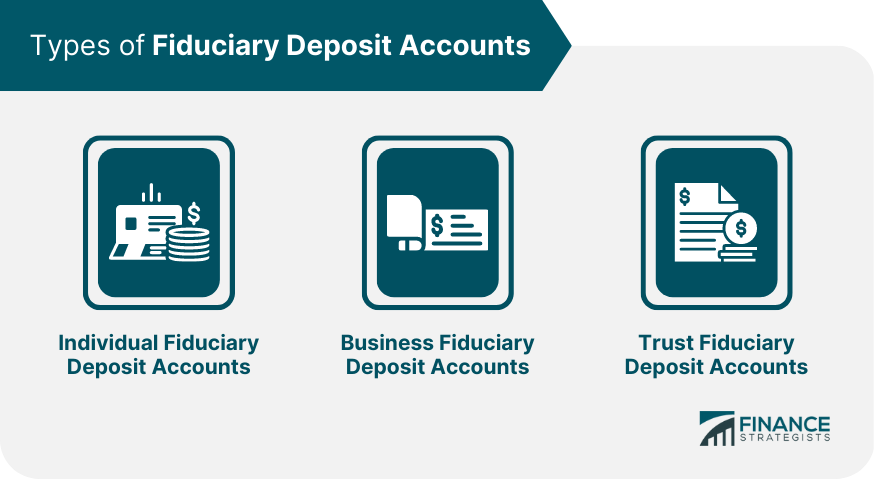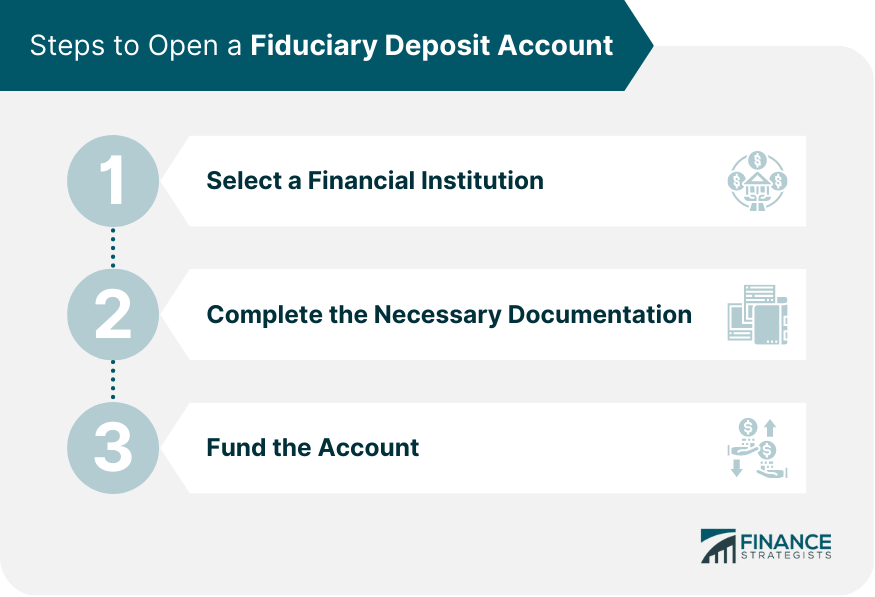A fiduciary deposit account is a type of financial account where the holder deposits funds into a trust or a managed account that is managed by a fiduciary. A fiduciary is a person or entity who is legally bound to act in the best interests of the account holder. Fiduciary deposit accounts are typically established for estate planning, charitable giving, and other financial planning purposes. One of the key benefits of a fiduciary deposit account is the protection and security of funds. The fiduciary is legally required to act in the best interests of the account holder and must manage the account prudently, ensuring that the funds are safeguarded and invested responsibly. Fiduciary deposit accounts may also offer tax advantages and greater flexibility than other types of financial accounts. Fiduciary deposit accounts typically have several key features. These may include low fees, competitive interest rates, and a range of investment options. In addition, the fiduciary will typically provide regular reports on the account's performance and investment strategy, allowing the account holder to stay informed about their investments. Fiduciary deposit accounts can be classified into several different types, depending on the intended purpose of the account. Individual fiduciary deposit accounts are typically established for estate planning purposes, such as managing assets in the event of a person's death or incapacity. These accounts may be used to manage funds for the benefit of minor children, elderly parents, or other dependents. They can also be used to protect and preserve assets, such as real estate or investments. These accounts may be used to manage funds for employee benefit plans, such as retirement plans or pension funds. They can also be used to manage funds for charities or other non-profit organizations. Trust fiduciary deposit accounts are typically managed by a trustee, who is responsible for investing the funds and distributing the proceeds according to the terms of the trust agreement. Trust fiduciary deposit accounts may be used to manage funds for a wide range of purposes, such as charitable giving, education, or medical expenses. The specific steps involved in opening a fiduciary deposit account may vary depending on the financial institution offering the account. Selecting a financial institution is the first step in opening a fiduciary deposit account. The account holder should research different financial institutions, such as banks and credit unions, that offer fiduciary deposit accounts and compare the features and benefits of each account. Factors to consider when selecting a financial institution may include the institution's reputation, the fees and expenses associated with the account, and the investment options available. Completing the necessary documentation is the second step in opening a fiduciary deposit account. The account holder must provide documentation that establishes their identity and legal authority to manage the funds, such as a will, trust agreement, power of attorney, or other legal document. The financial institution may also require additional documentation, such as proof of address or employment. Funding the account is the final step in opening a fiduciary deposit account. The account holder must transfer funds into the account, which may be done through a wire transfer, a check, or other means. The financial institution may also require a minimum deposit or ongoing minimum balance to maintain the account. Once the account is funded, the fiduciary can begin managing the funds in accordance with the account agreement. Managing a fiduciary deposit account typically involves selecting a fiduciary, defining their roles and responsibilities, and establishing an investment strategy and risk management plan. Choosing a fiduciary is a critical aspect of managing a fiduciary deposit account. The fiduciary should be someone who is trustworthy, experienced, and knowledgeable about finance. The fiduciary must also be legally bound to act in the best interests of the account holder. The fiduciary's roles and responsibilities will depend on the specific terms of the account agreement. Generally, the fiduciary is responsible for managing the funds in a responsible manner, investing the funds prudently, and reporting regularly to the account holder. Establishing an investment strategy and risk management plan is an important aspect of managing a fiduciary deposit account. The investment strategy should be designed to achieve the account holder's goals and objectives, while the risk management plan should be designed to minimize the risk of loss. There are several risks and considerations associated with fiduciary deposit accounts, including regulatory and legal requirements, fees and expenses, and potential liabilities. Fiduciary deposit accounts are subject to regulatory and legal requirements, including the duty to act in the best interests of the account holder and to manage the funds prudently. The fiduciary must also comply with applicable laws and regulations governing financial accounts and investments. Fiduciary deposit accounts may be subject to fees and expenses, including management fees, transaction fees, and other charges. The fees and expenses may vary depending on the financial institution offering the account and the specific terms of the account agreement. Fiduciary deposit accounts may be subject to potential risks and liabilities, including the risk of loss due to market fluctuations, errors in investment decisions, or fraud. The fiduciary may also be liable for any losses that occur as a result of their actions or decisions. A fiduciary deposit account is a type of financial account that offers a secure and trustworthy way to manage funds. There are several types of fiduciary deposit accounts, including individual, business, and trust accounts, which can be used for a variety of purposes. Individuals, families, charitable organizations, businesses, and professionals such as lawyers and financial advisors can all benefit from a fiduciary deposit account. To open a fiduciary deposit account, the account holder must complete the necessary documentation. Next funds must be transferred to the account. It is important to carefully consider the fiduciary chosen, define their roles and responsibilities clearly, and establish a sound investment strategy and risk management plan. While fiduciary deposit accounts offer several benefits, there are also several risks and considerations associated with these accounts. It is important to be aware of the regulatory and legal requirements governing these accounts. Consider as well the fees and expenses that may be associated with them. With proper management and oversight, however, fiduciary deposit accounts can provide a valuable benefit for those seeking to manage funds in a responsible and secure manner.Overview of a Fiduciary Deposit Account
Types of Fiduciary Deposit Accounts
Individual Fiduciary Deposit Accounts
Business Fiduciary Deposit Accounts
Trust Fiduciary Deposit Accounts

Steps to Open a Fiduciary Deposit Account
Select a Financial Institution
Complete the Necessary Documentation
Fund the Account

Managing a Fiduciary Deposit Account
Choosing a Fiduciary
Roles and Responsibilities of a Fiduciary
Investment Strategies and Risk Management
Fiduciary Deposit Accounts Considerations
Regulatory and Legal Requirements
Fees and Expenses
Potential Liabilities
Final Thoughts
Fiduciary Deposit Account FAQs
A fiduciary deposit account is a type of financial account where the holder deposits funds into a trust or a managed account that is managed by a fiduciary, who is legally bound to act in the best interests of the account holder.
Fiduciary deposit accounts can be beneficial for individuals, families, charitable organizations, businesses, and professionals such as lawyers and financial advisors who need to manage funds in a responsible and secure manner.
A fiduciary is a trusted professional who manages the funds in a fiduciary deposit account on behalf of the account holder. The fiduciary is legally bound to act in the best interests of the account holder, managing the funds in a responsible and secure manner. The fiduciary's role may include establishing an investment strategy, making investment decisions, monitoring the performance of the account, and reporting to the account holder on a regular basis.
The steps to opening a fiduciary deposit account typically involve selecting a financial institution, completing the necessary documentation, and funding the account. It is important to carefully consider the fiduciary chosen, define their roles and responsibilities clearly, and establish a sound investment strategy and risk management plan.
Risks and considerations associated with fiduciary deposit accounts include regulatory and legal requirements, fees and expenses, potential risks and liabilities, and the importance of carefully selecting a fiduciary and establishing clear roles and responsibilities.
True Tamplin is a published author, public speaker, CEO of UpDigital, and founder of Finance Strategists.
True is a Certified Educator in Personal Finance (CEPF®), author of The Handy Financial Ratios Guide, a member of the Society for Advancing Business Editing and Writing, contributes to his financial education site, Finance Strategists, and has spoken to various financial communities such as the CFA Institute, as well as university students like his Alma mater, Biola University, where he received a bachelor of science in business and data analytics.
To learn more about True, visit his personal website or view his author profiles on Amazon, Nasdaq and Forbes.











